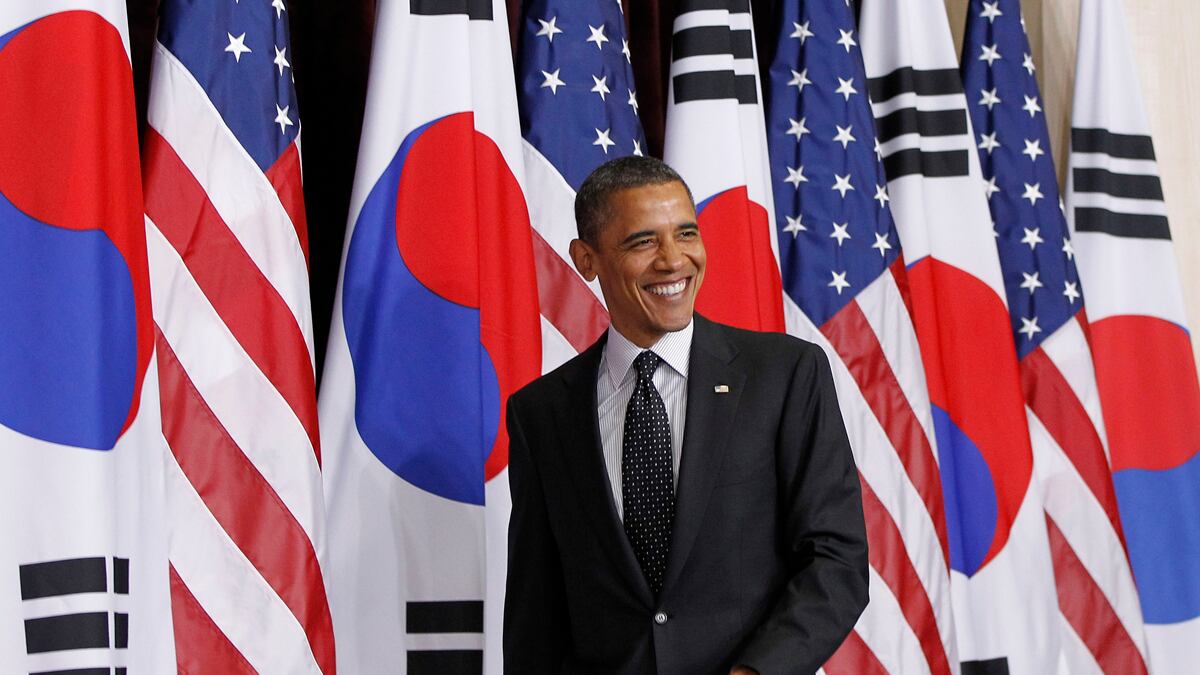Just when it looked as if Washington and Pyongyang were tiptoeing once again toward negotiations on North Korean nukes and missiles, the North has thrown a predictable grenade into the process and set all parties onto yet another warpath. Threatening to violate U.N. resolutions and undercut a recent understanding with Washington, Pyongyang reaffirmed last week that it plans to launch a satellite into orbit in April. This latest eruption and President Obama’s tough response were largely shrouded by other events—the nuclear summit in Seoul, more horrors in Syria, the trauma of Trayvon Martin’s killing, and the trials of Obamacare in the Supreme Court. But doubt not, the muffled eruptions will make international waves soon enough.
To complicate and confound matters further, North Korea has done more than simply throw grenades. In recent weeks, Pyongyang officials have been telling Americans in private, frank, and explicit ways just how the two sides can resolve the nuclear and missile issues. These messages will present Washington with some incredibly hard choices in the months ahead—between continuing to live with North Korean nukes for some time in a Cold Peace or pushing for their elimination and risking confrontation.
The rocket that brought much of this into public view was, well, a rocket. On Feb. 29, North Korea promised to suspend uranium enrichment at its main nuclear facility along with any long-range missile testing and nuclear tests in return for U.S. food aid and the prospect of further talks. Then, just two weeks later, Pyongyang proclaimed that it will launch a satellite into orbit in mid-April to mark the hundredth anniversary of the birth of its founder, Kim Il-sung. Obviously, the rocket that would propel the satellite would be a missile. But launching missiles is an international no-no, and Pyongyang’s missile launch would violate a U.N. Security Council ban on such tests, a resolution approved by China and Russia, no less.
Mr. Obama swiftly and angrily warned the North that he’d retaliate with more economic sanctions and more diplomatic isolation. Then, he added a rhetorical rocket of his own, one that must have rattled North Korean leaders much more than the prospect of stepped-up sanctions. He said North and South Korea were “one people.” To outsiders, that sounded like nothing; to North Koreans, it was the ultimate threat. To them, it had to sound like a U.S. commitment to destroy North Korea and reunify the peninsula under South Korean and American rule. (A footnote: the North told Washington about the prospective launch some time ago, and in the Feb. 29 talks, U.S. officials warned them against doing it, but did not cancel the agreed talks. Like its predecessors, this White House must have hoped—mistakenly—that the North would back down. And the North hoped, also mistakenly, that it could have its launch and eat its food aid, too.)

With neither side backing down, the play-by-play from here on could go like this: around mid-April, Pyongyang fires its rocket into space. If it goes over Japan or South Korea, those governments have promised to shoot it down. If the rocket just falls into the ocean somewhere, Washington will still scrap any plans to resume the six-party talks in the immediate future. In all likelihood, the U.S. also will increase sanctions against Pyongyang, most especially against its banking outlets in places like Macao. When President George W. Bush did his lockdown on Macao banking in 2005, Pyongyang retaliated with missile tests in July 2006 and a nuclear test in October 2006. Bush later canceled the Macao sanctions and opened talks with the North. Obama, being a Democrat, will not be afforded the luxury of that concession, especially before the November elections.
Or perhaps, this time, the North might not explode a nuke—it might sink another South Korea naval vessel, as it did in 2010. But this time, Seoul has promised it will meet force with force. And this time, the U.S. has pledged to back the South’s move. Now, prudent planners cannot count on the North’s saying “Uncle,” especially when it is being led by a new leader, Kim Jong-un, who also can’t afford concessions that make him look weak. In these ways, like it and want it or not, both sides could go off to confrontation land. Obama is pushing China, once again, to intercede and convince Pyongyang to cancel its rocket launch. The next two weeks could prove quite tense.
Behind these macho moves lie some pretty dramatic and portentous policy decisions. For some time, North Korean officials have been hinting at how they would like to settle matters with the U.S., and in recent conversations, official and non-official, here’s what they said: we intend to keep our nuclear weapons for some time to come, until we feel secure from your American threats. We see these talks as “a process” that might take one or two decades. In that time, we might give up our plutonium reprocessing plant but retain our newer uranium enrichment facilities. We might even identify our nuclear capabilities, and perhaps reduce them somewhat. Of course, all this would be in return for unspecified U.S. goodies.
American reaction to these ideas is bound to be negative, though Washington has been living with North Korea’s nuclear capability and nuclear weapons for decades already, since the days of President Reagan. To be sure, Washington has been trying to defang this capability, but it has been living with it. In all probability, Mr. Obama or a Republican successor will live with a nuclear North Korea as well—but won’t admit it.






